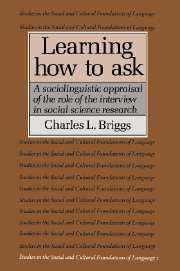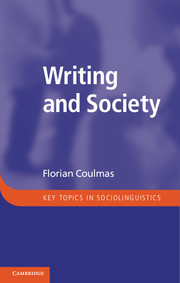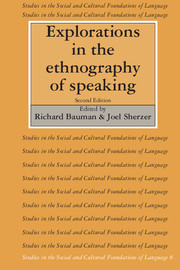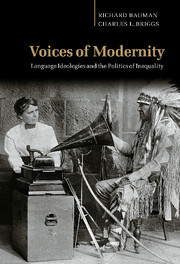
Learning How to Ask
A Sociolinguistic Appraisal of the Role of the Interview in Social Science Research
Part of Studies in the Social and Cultural Foundations of Language
- Author: Charles L. Briggs, Vassar College, New York
- Date Published: September 1986
- availability: Available
- format: Paperback
- isbn: 9780521311137
Paperback
Other available formats:
eBook
Looking for an inspection copy?
This title is not currently available on inspection
-
Interviews are ubiquitous in modern society, and they play a crucial role in social scientific research. But, as Charles Briggs convincingly argues in this book, received interviewing techniques rest on fundamental misapprehensions about the nature both of the interview as a communicative event, and of the nature of the data that it produces. Furthermore, interviewers rarely examine the compatibility of interviews as a means of acquiring information to one another. These oversights often blind interviewers to ensuing errors of interpretation, as well as to the limitations of the interview as a means of acquiring data. To conflict these problems, Professor Briggs presents an analysis of the 'communicative blunders' that he himself committed in conducting research interviews among Spanish-speakers in northern New Mexico. By focusing on these errors and exploring how they may be avoided, he is able to propose new techniques for designing, implementing, and analyzing interview-based research. These rest on identifying the subjects' resources for conveying information, and the relative compatability of the shared rules and understandings that underlie their strategies with those associated with interviews. Critical of existing paradigms of interviewing, which he sees as deriving from Western 'folk' theories of reality and communication, Briggs shows that the development of more sophisticated interviewing methodologies requires further research into interviewing itself. Briggs's conclusions provide a basis for the reexamination of current uses of interviews in a wide range of contexts - from social science research to job applications, welfare and health care delivery, criminal and legal investigations, journalism and broadcasting, and other areas of everyday life. His book will appeal to linguists, sociologists, anthropologists, historians, psychologists, as well as other readers whose research or professional activities depend on the use of interviews.
Reviews & endorsements
'More than any other recent work of a self-proclaimed hermeneutic/phenomenological 'reflexive' or self-reflective nature, Learning How to Ask avoids both the merely autobiographical, and the negative and unproductively relativistic form of critique of the fieldwork enterprise. Rather, it applies the tools of speech event analysis that have emerged from the cumulative formulations of a number of traditions of research and teaches us 'how to ask' with a new, sophisticated level of understanding. An argument about methodological refinement, it is at the same time a theoretical contribution to the linguistic anthropology of a foundational speech event in social science.' Michael Silverstein, University of Chicago
See more reviews'I would call this book 'brilliant' if the word were not so overused. Briggs's work is ethnography at its best, both critical and constructive. He is critically alert to the ways in which modes of inquiry condition what the fieldworker finds, and constructive in showing a way to arrive at grounded understanding.' Dell H. Hymes, University of Pennsylvania
Customer reviews
Not yet reviewed
Be the first to review
Review was not posted due to profanity
×Product details
- Date Published: September 1986
- format: Paperback
- isbn: 9780521311137
- length: 176 pages
- dimensions: 228 x 148 x 17 mm
- weight: 0.243kg
- contains: 1 b/w illus. 1 map
- availability: Available
Table of Contents
Foreword Aaron V. Cicourel
Preface
1. Introduction
2. The setting: Mexicano society and Córdova, New Mexico
3. Interview techniques vis-á-vis native metacommunicative repertoires
or, on the analysis of communicative blunders
4. The acquisition of metacommunicative competence
5. Listen before you leap: toward methodological sophistication
6. Conclusion: theoretical quagmires and 'purely methodological' issues
Notes
References
Index.
Sorry, this resource is locked
Please register or sign in to request access. If you are having problems accessing these resources please email [email protected]
Register Sign in» Proceed
You are now leaving the Cambridge University Press website. Your eBook purchase and download will be completed by our partner www.ebooks.com. Please see the permission section of the www.ebooks.com catalogue page for details of the print & copy limits on our eBooks.
Continue ×Are you sure you want to delete your account?
This cannot be undone.
Thank you for your feedback which will help us improve our service.
If you requested a response, we will make sure to get back to you shortly.
×







